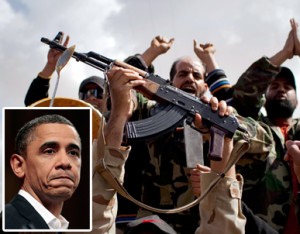The death of Libyan leader Moammar Gadhafi could create a vacuum that a whole new slew of Islamic terrorists and would-be despots seek to fill, says award-winning journalist Arnaud de Borchgrave.
There is a grave risk that the fractious nation divided along tribal lines could fracture or further weaken, creating a new breeding ground for terrorists, says de Borchgrave, who is on the board of LIGNET.com, a new Washington, DC-based intelligence analysis and forecasting service.
“Libya is where he was head of al-Qaida underground. Now he’s above ground and commander of the Tripoli garrison.”
Belhadj is the former leader of the Libyan Islamic Fighting Group (LIFG). As an engineering student in Tripoli he was opposed to the Gadhafi regime and was attracted to political Islam.
In the 1980s, he left Libya for Afghanistan where he fought as a mujahideen against Soviet forces. There, with other Libyans, he formed the LIFG to confront the Gadhafi regime and, according to some experts, formed links to al-Qaida.
In an exclusive interview, de Borchgrave, a founding board member of Newsmax.com, also says that:
- Gadhafi’s death will do little to help world oil prices in the short term as the country has to rebuild its infrastructure before it can restart pumping at full capacity.
- The search is on for the millions – possibly billions – of dollars that Gadhafi expropriated from his oil-rich nation.
- Syria is unlikely to follow Libya soon because of that country’s well-organized military and intelligence services.
- The recently uncovered Iranian plot to kill a Saudi ambassador “has an aroma of rotten fish, because it is not quite the way it’s been made out to be.”
De Borchgrave thinks Libya is facing a very momentous reconstruction effort that will slow the flow of oil.
“We are talking about half a year or a full year before everything gets repaired and in working order,” he told Newsmax.
De Borchgrave, who spent 30 years with Newsweek, was the first journalist to interview Gadhafi after he overthrew King Idris in 1969. He went on to interview him five more times.
“He was very engaging,” said de Borchgrave, now senior fellow at the Center for Strategic and International Studies, editor at large at United Press International and The Washington Times, and a Newsmax correspondent.
“I have had many private, off-the-record conversations with him. One was actually reading a message to Jim Woolsey when he was director of the CIA back in 1993 because at that point he was very concerned about Islamist extremism growing in the eastern part of their country.
“He wanted to make sure that he and the CIA were on the same wavelength about Islamist extremism. He demonstrated this by cooperating with the agency on some of those problems that were attendant to extremism.”
But despite that cooperation, de Borchgrave describes Gadhafi’s death as “a major plus for Libya.”
“Gadhafi’s been a big thorn in the side of the entire globe. He has used subversion and lavishly funded extremism underground – what I’ve called disinformation – to destabilize regimes that he was trying to overthrow, to help those who were in the business of replacing them.
“He’s been a big nuisance all over the world and I think everybody’s delighted to see him go.”
De Borchgrave said now the search is on for the millions – possibly billions – of dollars that Gadhafi expropriated from his oil-rich nation.
“I have no idea who will wind up with it because what he has underground, I think it’s about $70 million, has to be found first. As to what he has around the world in various deposits, I would imagine that will take a long time to adjudicate,” he said.
Looking to the future, de Borchgrave said he does not believe that Gadhafi’s downfall will mean that the regime in Syria will follow.
“Syria has a very strong secret police intelligence apparatus that controls the country that has killed about 33,500 people so far in putting down the countrywide rebellion.
“It also controls the country through its 14 intelligence services a lot better than Gadhafi controlled Libya.” He said Syria’s “mild-mannered” leader Bashar al-Assad is not the real power in that country. “It’s a younger brother who is very tough and a chip off the old block.”
De Borchgrave also said there are many questions to be asked about the alleged Iranian plot to blow up the Saudi ambassador to Washington. He agreed with conservative commentator Pat Buchanan who told Newsmax on Wednesday that the plot smelled fishy.
“I’d say it has an aroma of rotten fish, because it is not quite the way it’s been made out to be,” said de Borchgrave. “In fact there are indications today that the famous operative that was allegedly working for Iran’s Quds force – that’s the branch of the military that deals with spreading terrorism abroad and helping terrorist movements abroad – could very well have been from a totally different organization that has very little to do with Tehran.”
And he said neither the U.S nor Saudi Arabia has an incentive to attack Iran even if the plot were real. “Everybody’s being very careful not to take Iran to the edge of a military showdown,” he said.
“The three former CENTCOM commanders that I know and have spoken publicly about this, Gen. (Anthony) Zinni, Gen (John) Abizaid and Adm. (William) Fallon, all three have said we should learn to live with an Iranian nuclear bomb.
“By that they mean that Iran is surrounded by four of the world’s eight nuclear powers, they’re an ancient civilization and they also have formidable asymmetrical retaliatory capabilities up and down the entire Persian Gulf. They can close the Straits of Hormuz, obviously not for long, but just the very fact that it was closed, even for a short period, would treble oil prices around the world.”









